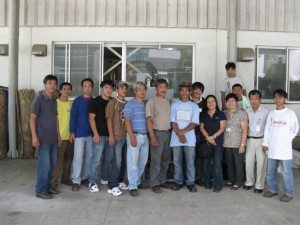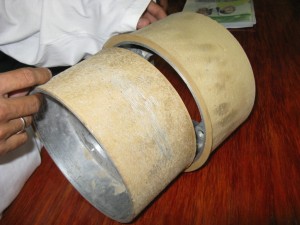It’s a common practice for the government to donate machines to farmers. It is not a common practice to provide follow up technical support on the operation and maintenance of the machines.
Three sets of custom-built post-harvest machines were designed, manufactured and installed for use in our project areas last year. (See our blog post August 23, 2009)
A basic operator training was given to the farmer/operators at the time of installation and the farmer/operators went on to successfully process their 2009 harvest for export sales and then subsequent amounts, throughout the year, for local domestic sales.
But machine operators felt that they needed a more intensive training on trouble shooting, repair and maintenance of their new machines. At the request of RICE, Inc., a training module was designed by the PhilRice Engineering Department, in coordination with JHT Manufacturing Company, the machine’s fabricator. A 2 day workshop at PhilRice August 19 and 20, 2010 provided a well organized training with both lectures and a “hands-on” practicum.
The trainers were excellent. They were able to present highly technical information in a practical way that made sense to the farmers. A training manual was written that outlined and described step-by-step processes; it was made easy with pictures and outlined descriptions. At least five different languages were spoken among the trainers and the eight participating farmer/operators. It was important that all operators learned and used a common language for the parts of the machines and the tools that they used.
The second day of the training focused on the “actual” troubleshooting and operation of the machine. Although the machines were not identical models, the participants were challenged to understand basic functions. Working as provincial teams, the participants had to dismantle and reassemble the “dehuller-grain paddy separator.” Each team had to work together; they had to understand how each part of the machine worked, and explain to the trainers what they were doing as they reassembled the machine.
The “rubber roll” shown at the left, which is used in dehulling the grain, is the perfect example of why there is a need for such training. The rubber rolls are very expensive parts. Not manufactured in the Philippines, they must be imported from Thailand or Vietnam. The rolls should be able to dehull at least 30MT of palay before they show wear. But this roller was worn out before 10 metric tons were dehulled. This indicates that the machine was not operated properly and that wear and tear on other parts of the machine would probably be indicated.
Training was also given on the micro-mill.
The project is still in need of a winnowing/air screen-cleaning machine to replace the hand winnowing currently being done. PhilRice is working on an appropriate design but we will still need to raise funds for the manufacturing and procurement of the machine.
PhilRice Deputy Director Eulito Bautista stopped by to observe the training and to highlight the partnership of PhilRice and the Cordillera Heirloom Rice Project. He said that the partnership still has much work to do in order to help the terraces farmers achieve the benefits of post harvest technology in their farming activity.
All agreed that it was a very successful training. Participants had achieved a new confidence as operators. They went home with new skills and a Machine Manual for Operators. PhilRice provided a holistic training design with very thorough, knowledgeable trainers and in an atmosphere of partnership. They also acknowledged the importance of follow up support to farmers who receive new machines and technologies.
We would like to sincerely thank PhilRice for their continued partnership on this project. We would especially like to thank the Department of Agriculture’s Agricultural Training Institute (ATI) at Benguet State University for the counter-part support in funding this training.





Leave a comment